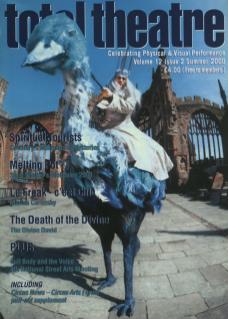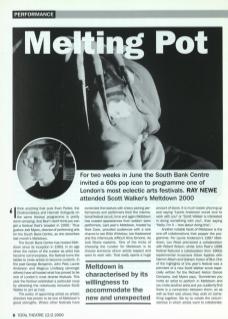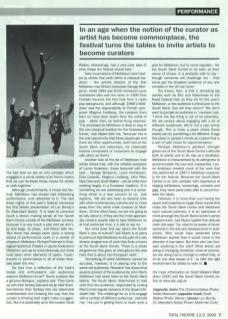‘I think anything that puts Evan Parker, the Cholmondeleys and Hannah Schygulla on the same festival programme is pretty damn amazing. And Blur! I don't think you can get a festival that's broader in 2000.' Thus gushes Jodi Myers, director of performing arts for the South Bank Centre, as she describes last month's Meltdown.
The South Bank Centre has hosted Meltdown since its inception in 1993. In an age when the notion of the curator as artist has become commonplace, the festival turns the tables to invite artists to become curators. In the past George Benjamin, John Peel, Laurie Anderson and Magnus Lindberg (amongst others) have all hosted what has proved to be one of London's most diverse festivals. This year the festival celebrated a particular coup by attracting the notoriously reclusive Scott Walker to act as host.
The policy of appointing artists as artistic directors has proven to be one of Meltdown's great strengths. Where other festivals have contented themselves with cherry picking performances and performers from the international festival circuit, time and again Meltdown has coaxed appearances from seldom seen performers. Last year's Meltdown, hosted by Nick Cave, provided audiences with a rare chance to see Billie Whitelaw, Lee Hazlewood and the infamously difficult Nina Simone. As Jodi Myers explains, 'One of the tricks of choosing the curator for Meltdown is to choose someone whom artists respect and want to work with. That really opens a huge amount of doors. It is much easier phoning up and saying "Laurie Anderson would love to work with you" or "Scott Walker is interested in doing something with you", than saying "Hello, I'm X – how about doing this”.'
Another notable facet of Meltdown is the one-off collaborations that pepper the programme. For Laurie Anderson's 1997 Meltdown, Lou Reed premiered a collaboration with Robert Wilson; whilst John Peel's 1998 festival featured a collaboration from 1960s experimental musicians Silver Applies with Damon Albarn and Graham Coxon of Blur. One of the highlights of this year's festival was a premiere of a new Scott Walker score especially written for the Richard Alston Dance Company. Jodi Myers says, 'Sometimes you invite an artist to perform in Meltdown and you invite another artist and you suddenly find there is a connection between them, so as well as their solo shows they work on something together. We try to create the circumstances in which artists want to collaborate. The fact that we are an arts complex which engages in a whole variety of art forms means that we can facilitate those moves for artists to work together.’
Although predominantly a music-led festival, Meltdown has always had interesting performance work attached to it. The last three nights of this year's festival witnessed the first British presentation of Luc Bondy's En Attendant Godot. 'It is hard to conceive [such a show] making sense at the South Bank Centre outside of the Meltdown context, because it is very much a play and we don't, by and large, do plays,' Jodi Myers tells me. 'But there has always been quite a strong strand of performance work in a variety of shapes in Meltdown. Richard Foreman's Ontological Hysterical Theatre in Laurie Anderson's Meltdown springs to mind obviously, but there have been other elements of opera, music theatre or performance in all of these festivals down the line.’
So how true a reflection of the host's tastes and enthusiasms can audiences assume Meltdown to be? 'Some curators like a genuine dialogue,' explains Jodi. 'They come up with their fantasy lists and we go after them. Sometimes their fantasy lists are absolutely undeliverable but knowing the way that the curator is thinking [we] might make a suggestion. But it is absolutely up to the curator. Scott Walker, interestingly, had a very clear idea of what shape the festival should take.'
Early incarnations of Meltdown were hosted by artists that work within a classical tradition – the artistic director of the first Meltdown was British composer George Benjamin, whilst 1994 saw Dutch composer Louis Andriessen take over the reins. In 1995 Elvis Costello became the first host from a more pop background, and although 1996's Meltdown was the responsibility of Finnish composer Magnus Lindberg, the curators from then on have been drawn from the world of pop – albeit from its farther-flung reaches.
‘The emphasis for Meltdown is likely to stay in the non-classical tradition for the foreseeable future,’ Jodi Myers tells me, ‘because this is the only opportunity that those people get and there are other opportunities, both here at the South Bank and elsewhere, for classically trained composers or musicians to engage with other art forms.'
Another look at the list of Meltdown host artists shows that, with the notable exception of Laurie Anderson, those favoured with the task – George Benjamin, Louis Andriessen, Elvis Costello, Magnus Lindberg, John Peel, Nick Cave and Scott Walker – are all white men working largely in a European tradition. ‘It is something we are addressing and it is something which is a real concern to us,’ Jodi explains. 'We are very keen to develop links with other contemporary cultures and to move away from the white male curators at Meltdown. On the other hand, we are not going to be silly about it. If they are the most appropriate creative people able to take Meltdown on at that particular time, it is silly to say no.'
But what does this say about the South Bank's view of culture? Jodi Myers is at pains to point out that Meltdown is only part of a very diverse programme of work that finds a home at the South Bank Centre. ‘There is a whole programme that goes on throughout the year here that is about non-European work.’
Something of which Meltdown cannot be accused, however, is of playing only to the same old audiences. Research has shown that seventy percent of the audience for John Peel's Meltdown had never been to the South Bank before. The South Bank, determined to hold onto this new audience, responded by inviting Peel to host regular sessions at the Queen Elizabeth Hall. ‘The challenge for us is to engage with a number of different audiences,’ Jodi tells me, 'not just in getting them to book once a year for Meltdown, but to come regularly – for the South Bank Centre to be seen as their venue of choice. It is probably safe to say – though someone will challenge me – that we've got the broadest audience of any arts complex in the UK bar none.'
The theory, then, is that in attracting big names such as Blur and Radiohead to the Royal Festival Hall, as they did for this year's Meltdown, a new audience is introduced to the South Bank. But will they return? 'We don't want to just get an audience in,' counters Jodi. ‘I think the key thing is not to be tokenistic. We are serious about engaging with a lot of different audiences. We're not a pop venue though. This is more a place where those artists can try something a bit different. It logs this place in people's minds as a place that is a sort of safe house for experimentation.'
Perhaps Meltdown's greatest strength grows out of the South Bank Centre's attitude both to artists and to its role as a facilitator – Meltdown is characterised by its willingness to accommodate the new and unexpected. Laurie Anderson created much of the work that she performed at 1997's Meltdown especially for the festival. Because the South Bank Centre is an arts complex with experience of staging exhibitions, screenings, concerts and gigs, they were particularly able to accommodate her ideas.
However, it is more than just having the space and expertise to stage these events that make the South Bank Centre and Meltdown such natural partners; it is an openness of mind amongst the South Bank Centre's senior programmers. Jodi Myers typifies this attitude when she says: ‘You need to be aware of developments in the arts and developments in audiences. Who would have predicted when Meltdown started that it would move in the direction it has taken. But then who can forecast anything in the arts? What artists are doing is changing, therefore, what art promoters are doing has to change to reflect that, or to be one step ahead of it – to offer the right environment for artists to work in.'
For more information on Scott Walker's Meltdown 2000 visit the South Bank Centre online at www.sbc.org.uk


